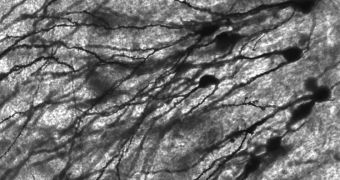A particular class of neurons, that is wiped out during the early stages of Alzheimer's disease, has just been derived from human embryonic stem cells by a team of experts in the United States.
The discovery is groundbreaking, as it could provide researchers with the necessary tools to address this form of dementia in a new way, possibly through transplants performed early on in the condition.
There are multiple types of neurons in the brain, each of them involved in its own function. The class that was targeted in the study plays a critical role in retrieving memories.
Due to the new achievement, scientists can now grow these nerve cells inside lab dishes, and analyze them in tightly controlled confines. This could help them determine why the cells die when Alzheimer's sets in, LiveScience reports.
The research team that made the discovery was led by Christopher Bissonnette, who is based at the Northwestern University Feinberg School of Medicine, in Chicago. The team leader explains that growing neurons in the lab also provides a way for researchers to investigate new drugs.
“This would not be a cure for Alzheimer's, [but it will] hopefully reverse the memory deficits and symptoms” this form of dementia triggers, the expert adds. A paper detailing the findings appears in the March 4 issue of the esteemed scientific journal Stem Cells.
Speaking about the possibility of implanting stem cell-derived neurons into the brains of dementia patients, the Northwestern team says that this is definitely a possibility. It might even be easier to do so than use other forms of medication.
“The cells would not be recognized as foreign cells by the patient's immune system, and thus would be less likely to be rejected,” Bissonnette explains. There would be no need for immunosuppressive drugs.
At this point, the research team is trying to determine what is the optimum time for inserting these neurons into the brain. They want to learn whether the cells would simply die off like their predecessors did, or if they will survive.
It is possible that inserting new neurons would only make a difference after other drugs are administered, when the disease is already beginning to take a turn for the better.
At this point, scientists simply don't know all this. Further investigations are required in order to understand all the ramifications of this discovery, the team concludes.

 14 DAY TRIAL //
14 DAY TRIAL //